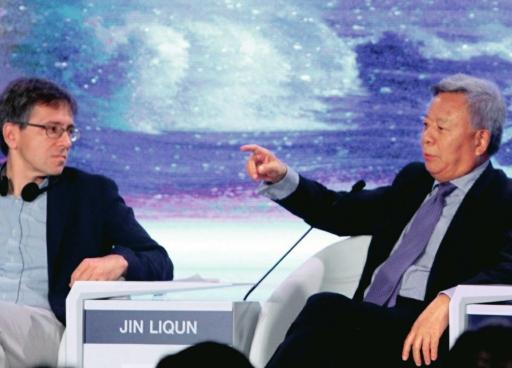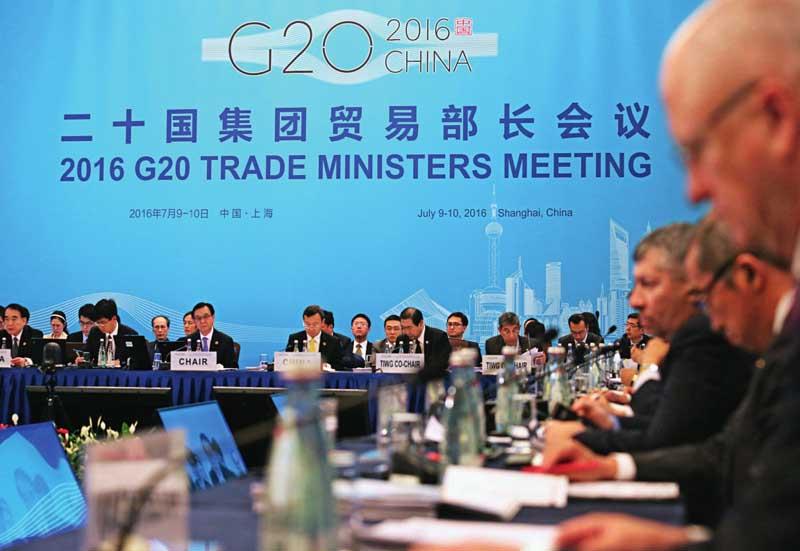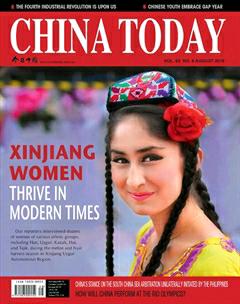How Can World Economic Growth Be Maintained under the New Normal?
By HE YAFEI


W ORLD Bank data released on June 7 imply that world economic growth in 2016 is likely to be below 2.4 percent. This is yet another occasion on which the International Monetary Fund and World Bank have recalibrated and lowered their predictions of 2016 world economic growth. The economic sphere is indeed currently fraught with widespread concern and pessimistic prognoses.
The expected recovery period after a global financial crisis is five to seven years. However, eight years have passed since the 2008 financial debacle, and world economic recovery remains sluggish.
The Western developed world is still ridden with excessive debt, high unemployment, and low growth. The sustained world economy depression, plus the Federal Reserves raising of interest rates and appreciating of the U.S. dollar have caused fluctuations in the global financial market, and falling bulk commodity prices. Meanwhile, most developing countries have suffered economic slowdowns, depreciation of their currencies, and higher debts. Its highly possible that the world economy has now reached the bottom of the “L-shaped” growth curve, signifying that these doldrums will continue for a while. The situation can be ascribed to factors causing periodic economic fluctuations, and an imbalanced world economy in sore need of structural adjustment.
It is generally agreed that the following factors significantly influence the world economy:
First, Chinas remarkably rapid economic development exerts considerable influence on the world economy. Now at the critical stage of structural adjustment, the country is shifting to a new economic growth mode based more on demand than investment and export, as its service industry share simultaneously increases. Whats more, Chinas supply-side structural reform has kicked off, and its economic adjustment achieved preliminary results.
Second, as key commodity prices have stayed low, certain emerging economies whose economy heavily relies on resource exports are seeing their debts mounting, their currencies depreciating, and their GDP contracting. Taking the falling crude oil price as an example, this should, in theory, have stimulated the demand for and consumption of crude oil, and so promoted economic development in the countries importing the fuel. The sluggishness as a whole of the world economy, however, has impaired the positive effect of this drop in price.
Third, in the developed world, the Federal Reserve has tightened U.S. monetary policy, so bolstering the persistent strengthening of the U.S. dollar. Meanwhile, an easing monetary policy still prevails in the Eurozone and Japan. Certain Western developed countries have even, unprecedentedly, resorted to the “negative interest” policy tool. The interest on Germanys 10-year-term treasury bonds, for instance, has fallen below zero. All this has exacerbated international financial market fluctuations, encouraged the currency-hedging tendency, and deteriorated the international financial environment, so impeding economic development in the emerging markets.
Fourth, an anti-globalization force is rising in tandem with the globalization trend, evident in mounting populist and nationalist sentiments in some countries, developed ones in particular, as can been seen in the U.S. presidential campaign, and the Brexit.
Meanwhile, geopolitical conflicts between great powers are worsening and global stability is under threat. Anti-globalization has fueled political isolationism and trade protectionism, so undermining the foundation of big power cooperation as well as the spirit of braving adversity in solidarity, both necessary for world economic growth. The downward trend in the world economy is difficult to reverse without adequate cooperation between major economies in the macro-economy field.
In this complex international environment, the international community is naturally looking to China. With its ongoing economic transformation and anticipated mid- to high-speed growth under the new normal, they hope the Asian power might continue to be the engine of world economic development, and contribute to the world economy “Chinese wisdom and Chinese plans.”This explains why the international community has placed such high hopes on this years G20 Summit to be hosted by China.
The world economy has now reached an era of new industrial revolution wherein fresh economic and financial modes emerge one after another and gain rapid devel- opment. In view of the overt neo-liberalism of Western countries like the U.S. and the shattering of the Washington Consensus, the whole world seeks a new growth and development mode. As the worlds second largest economy that contributes more than 30 percent to annual world economic growth, and taking into account the 2016 G20 rotating presidency, what should China do amid the worlds languid economic growth to boost the world economy?
First, good management of its domestic affairs is Chinas biggest contribution. Chinas comparative advantage as regards economic growth is changing dramatically. The countrys opening-up drive has reached a new stage characterized by high-quality foreign investment and large-scale “going global” (including capital exports). China needs to open up its service industry wider and promote the upgrading of its industries along the global value chain, so to better adapt to the economic new normal.
Under the guidance of its overall national development strategy, China is actively pushing forward such programs as the Belt and Road Initiative, the coordinated development of Beijing-Tianjin-Hebei, and the building of the Yangtze River Economic Belt. China will do its best to bring into full play its socialist market economy advantages, and so realize industrial upgrading and economic transformation.
To ensure mid- to high-speed sustainable economic growth and continuance of its role as one of the major world economic growth engines, China must steadily advance its economic transformation and build an open economic system by taking advantage of the new industrial and information revolutions. The country must also continue its supply-side reform while boosting the aggregate demand in light of the concept of innovative, coordinated, green, open, and shared development.
Second, China should enact its world economic leadership role as a key member of G20 and the 2016 rotating president, and further coordinate major economies macro-economic and financial policies in order to avoid any negative spillover effect of the policies of certain big powers. It may thus mitigate risks of financial turbulence and enhance market confidence.
Developed Western countries conflicting monetary policies have worsened uncertainties in the global financial system, a phenomenon that historical evidence confirms again and again. Their alternate easing and tightening of monetary policy have triggered several financial crises in emerging economies in recent history, for example in Latin American countries in the 1970s, and in Asia in the 1990s. The hard-won wealth of those countries and peoples thus vanished.
As a world major economy and representative of developing countries, China is expected to fight for developing countries rights and interests in international entities like the IMF, World Bank and G20, and to participate in reforming the existing world financial and monetary systems. China should also make efforts to promote South-South Cooperation by resorting to such new-type international financial institutions as the BRICS Development Bank, Silk Road Fund, and Asian Infrastructure Investment Bank. The goal is to build up developing countries capacity to resist external financial risks and cope better with the accompanying financial disturbance.
Third, China should, as it gains more voice in the world economic and financial arena, actively lead global economic governance system reforms, first of all to the world financial and monetary systems. It should also proactively push forward implementation of measures by international financial institutions to strengthen management of influential cross-border banks and financial institutions, according to the requirements of leaders of G20 member states, thus laying a sound foundation for world economic growth.
Since 2008, shifts in the global power balance and emerging new situations in the world economy have strengthened the demand for major adjustment and reform of the global economic governance system. The West-dominated system should shift to one featuring joint governance by both the West and East. New concepts, new mechanisms, and new methods are thus needed. As a global power, China should play a leading role in the world economy, and gradually advance reforms of the global economic governance system. Great hopes rest on Chinas role as bellwether at the upcoming G20 Summit for pushing forward global reforms.
Some reform measures have surfaced, for example steadily advancing RMB internationalization and diversifying pricing currencies for bulk commodities so as to reduce big fluctuations in bulk commodity prices.
As required by previous G20 Summit leaders declarations, the fragmentation of global governance and geopolitical tensions are issues that must be immediately addressed. A good global environment for free trade and investment should be created and trade protectionism should be opposed. There are now as many as 450 free trade areas. The Trans-Pacific Partnership Agreement(TPP) and Transatlantic Trade and Investment Partnership (TTIP) advocated by the U.S., however, continue to preclude countries like China. This highlights the urgency of these issues.

